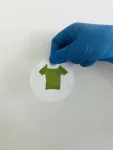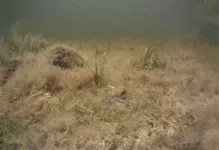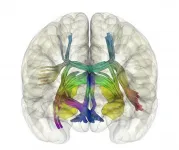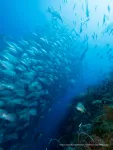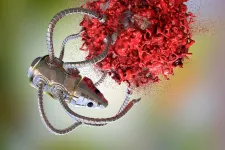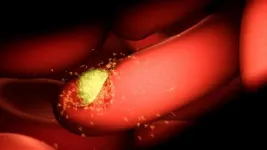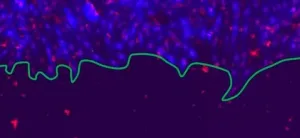Need to vent? Turn to real-life support, not social media
Research finds social support provided over social media does not improve mental health for excessive social media users
2021-05-03
(Press-News.org) Social media may make it easier for people to engage online, but I does not provide certain benefits of real-life human interactions, says a Michigan State University researcher.
"Problematic social media use has been associated with depression, anxiety and social isolation, and having a good social support system helps insulate people from negative mental health," said Dar Meshi, an assistant professor in the Department of Advertising and Public Relations at MSU. "We wanted to compare the differences between real-life support and support provided over social media to see if the support provided over social media could have beneficial effects."
The research was published online April 29 in the journal Addictive Behaviors.
While social media support did not negatively impact mental health, it did not positively affect it either.
"Only real-life social support was linked to better overall mental health," Meshi said. "Typical interactions over social media are limited. We theorize that they don't allow for more substantial connection, which may be needed to provide the type of support that protects against negative mental health."
Meshi and Morgan Ellithorpe, an assistant professor in the Department of Communication at the University of Delaware and a co-author on this paper, conducted a survey of 403 university students to identify how problematic their social media use was and their degree of social support in real-life and on social media.
By also using the PROMIS, or Patient-reported Outcomes Measurement Information System, scales for measuring depression, anxiety and social isolation, the researchers could see how the students' social media use and social support related to their mental health.
Problematic social media use is not a recognized addictive disorder, but there are similarities in the symptoms of someone with a substance use disorder and a person displaying excessive social media use. Examples include preoccupation with social media and signs of withdrawal, such as irritability, when prevented from using social media.
"It appears that the more excessive one's social media use is, the less social support that person gets in real life, which leads to poor mental health," Ellithorpe said.
Meshi and Ellithorpe encourage people who are using too much social media to reach out to people in real life for social support.
INFORMATION:
(Note for media: Please include the following link to the study in all online media coverage: https://www.sciencedirect.com/science/article/abs/pii/S0306460321001349/)
Michigan State University has been working to advance the common good in uncommon ways for more than 165 years. One of the top research universities in the world, MSU focuses its vast resources on creating solutions to some of the world's most pressing challenges, while providing life-changing opportunities to a diverse and inclusive academic community through more than 200 programs of study in 17 degree-granting colleges.
For MSU news on the Web, go to MSUToday. Follow MSU News on Twitter at twitter.com/MSUnews.
ELSE PRESS RELEASES FROM THIS DATE:
2021-05-03
Living materials, which are made by housing biological cells within a non-living matrix, have gained popularity in recent years as scientists recognize that often the most robust materials are those that mimic nature.
For the first time, an international team of researchers from the University of Rochester and Delft University of Technology in the Netherlands used 3D printers and a novel bioprinting technique to print algae into living, photosynthetic materials that are tough and resilient. The material has a variety of applications in the energy, medical, and fashion sectors. The research is published in ...
2021-05-03
Nearly 10,000 acres of lush seagrass vanished from Florida Bay between 1987 and 1991, leading to massive ecological changes in the region near the Florida Keys. Abundance of the seagrass, Thalassia testudinum, more commonly known as turtlegrass, a foundation species of the Florida Bay ecosystem, decreased extensively during what is considered to be one of the largest declines in seagrass cover in recent history.
Researchers from the University of South Florida, the Florida Fish and Wildlife Conservation Commission (FWC) and the University of North Carolina Wilmington documented the response of seagrasses after the die-off. ...
2021-05-03
31 percent of pet dogs and 40 percent of pet cats tested positive to COVID-19 after their owners' own diagnoses, though under half displayed symptoms, in small Brazilian study.
INFORMATION:
Publicly available article: https://journals.plos.org/plosone/article?id=10.1371/journal.pone.0250853
Article Title: Investigation of SARS-CoV-2 infection in dogs and cats of humans diagnosed with COVID-19 in Rio de Janeiro, Brazil
Funding: MMS: This study was supported by CGLab/MoH (General Laboratories Coordination of Brazilian Ministry of Health), CVSLR/FIOCRUZ (Coordination of Health Surveillance and Reference Laboratories ...
2021-05-03
Thanks to the so-called deep learning, a subset of artificial intelligence (AI) algorithms inspired by the brain, machines can match human performance in perception and language recognition and even outperform humans in certain tasks. But do these synthetic biologically inspired systems learn in the same way that we do?
According to a new article by first author Dr. Diogo Santos-Pata from the Synthetic Perceptive, Emotive and Cognitive Systems lab (SPECS) at IBEC led by ICREA Professor Paul Verschure, in collaboration with Prof. Ivan Soltesz at Stanford University, the mechanism of autonomous learning underlying these AI systems reflects nature more closely than previously thought. With their hypothesis and model, these scientists offer new insights into ...
2021-05-03
A world first study within the Great Barrier Reef Marine Park has found limited fishing zones (yellow zones) are still important conservation and fisheries management tools when paired with no-fishing zones.
Lead author Dr April Hall, from the ARC Centre of Excellence for Coral Reef Studies at James Cook University (Coral CoE at JCU), said partially protected yellow zones still contain healthy numbers of reef fish targeted for recreational and commercial fishing. These include coral trout, tropical snappers, emperors and tuskfish.
Yellow zones limit, rather than prohibit, fishing through fishing gear restrictions. For example, limited line fishing is allowed with one rod or line and one hook per ...
2021-05-03
Bowel cancer survival rates could be improved if chemotherapy drugs were delivered via tiny nanoparticles to the diseased organs rather than oral treatment.
That's the finding from Indian and Australian scientists who have undertaken the first study, using nanoparticles to target bowel cancer, the third most common cancer in the world and the second most deadliest.
The researchers have shown in animal experiments that nanoparticles containing the chemotherapy drug Capecitabine (CAP) attach themselves directly to the diseased cells, bypassing healthy cells and therefore reducing toxic side effects as well as the size and number of tumours.
The scientists, from the Manipal Academy of Higher Education, Indian Institute of Science and the University of South Australia, ...
2021-05-03
National Health and Medical Research Council, the European Research Council and the Victorian Government.
WEHI researchers have identified how natural human antibodies can block malaria parasites from entering red blood cells, potentially indicating how new protective therapies could be developed against this globally significant disease.
The research provides greater insight into how antibodies block the entry of Plasmodium vivax malaria parasites into young red blood cells called reticulocytes. It builds on an earlier discovery that the P. vivax latches onto the transferrin receptor 1 (TfR1) to enter cells.
The research, led by Associate Professor Wai-Hong Tham and PhD student Li-Jin Chan ...
2021-05-03
Many drug addicts take not only one substance but rather several. Scientists at the Max Planck Institute of Experimental Medicine in Göttingen have investigated the role that genes and the environment play in the development of such multiple substance consumption or polytoxicomania. Their results show that, in addition to genetic factors, the accumulation of several unfavourable environmental factors causes people to slip into such an extreme form of multiple drug use. Among the risk factors were sexual and physical abuse, living in a big city, and migration experience as well as the use ...
2021-05-03
Aromaticity, a concept usually used to explain the striking stability and unusual reactivity of certain carbon-based molecules, could inspire the design of new catalysts with novel uses, KAUST researchers have shown.
Chemists first came upon the anomalous behavior of aromatic molecules in the nineteenth century while studying benzene. The unexpected stability of this six-carbon cyclic structure comes down to its electrons.
In general, bonding electrons hold a specific pair of atoms together in a discrete chemical bond. But in benzene, six electrons form a delocalized ring across the molecule. A host of other molecules share this feature. "Many classic examples of organic and organometallic reactivity can be explained on this basis," says Théo Gonçalves, ...
2021-05-03
In material physics understanding how systems interact across the interfaces separating them is of central interest. But can physical models clarify similar concepts in living systems, such as cells? Physicists at the University of Geneva (UNIGE), in collaboration with the University of Zurich (UZH), used the framework of disordered elastic systems to study the process of wound healing - the proliferation of cell fronts which eventually join to close a lesion. Their study identified the scales of the dominant interactions between cells which determine this process. The results, published in the journal Scientific Reports, will allow better analysis of cell front behaviour, in terms of both wound healing and tumour development. In the future, this approach may offer personalised diagnostics ...
LAST 30 PRESS RELEASES:
[Press-News.org] Need to vent? Turn to real-life support, not social media
Research finds social support provided over social media does not improve mental health for excessive social media users
